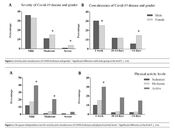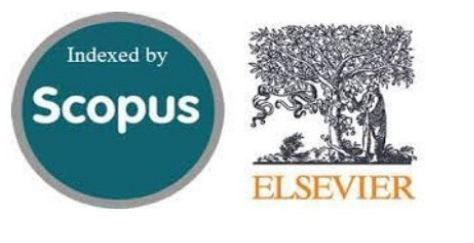Lifestyle Behaviors Predict COVID-19 Severity: A Cross-Sectional Study
Keywords:
Eating Disorder, Sleep Disorder, COVID-19 Pandemic, Exercise, LifestyleAbstract
Background: The COVID-19 pandemic has put immense pressure on global health systems, especially developing countries with weaker health systems. Objectives: In the present study, we were looking to see if lifestyle behaviors could predict the severity and recovery duration of COVID-19. Methods: A total of 1 192 participants between the ages of 18 and 70 years participated voluntarily in a web-based survey. Food pattern and physical activity levels were respectively evaluated using the Food Frequency Questionnaire (FFQ) and the Rapid Assessment of Physical Activity (RAPA). The Pittsburgh Sleep Quality Index (PSQI) was also used to evaluate sleep disorders. Analysis of variance, chi-square test, and multinomial logistic regression were used to analyze the data. The significance level was P ≤ 0.05. Results: The findings suggested that patients with lower levels of physical activity, sleep disorders, and unhealthier dietary patterns were affected by more severe COVID-19 and longer recovery time (P ≤ 0.05). We found that physical activity and sleep quality predicted the severity of COVID-19, and physical activity and dietary patterns predicted the recovery time from COVID-19 (P ≤ 0.05). Conclusions: In conclusion, lifestyle behaviors, such as unhealthy diets, inactivity, and sleep quality disturbance, affect the severity and duration of COVID-19.
Downloads
References
1. Lange KW, Nakamura Y. Lifestyle factors in the prevention of COVID19. Glob Health J. 2020;4(4):146-52. [PubMed ID: 33520339]. [PubMed
Central ID: PMC7834031]. https://doi.org/10.1016/j.glohj.2020.11.002.
2. Dergaa I, Abdelrahman H, Varma A, Yousfi N, Souissi A, Ghram A, et al.
COVID-19 vaccination, herd immunity and the transition toward
normalcy: Challenges with the upcoming sports events. Ann Appl
Sport Sci. 2021;9(3):0. https://doi.org/10.52547/aassjournal.1032.
3. Taheri M, Esmaeili A, Irandoust K, Mirmoezzi M, Souissi A, Laher I, et
al. Mental health, eating habits and physical activity levels of elite
Iranian athletes during the COVID-19 pandemic. Sci Sports. 2023.
[PubMed ID: 37362084]. [PubMed Central ID: PMC10243596].
https://doi.org/10.1016/j.scispo.2023.01.002.
4. Irandoust K, Taheri M, Chtourou H, Nikolaidis PT, Rosemann T,
Knechtle B. Effect of time-of-day-exercise in group settings on level of
mood and depression of former elite male athletes. Int J Environ Res
Public Health. 2019;16(19). [PubMed ID: 31546685]. [PubMed Central
ID: PMC6801561]. https://doi.org/10.3390/ijerph16193541.
5. Jarosz E. Lifestyle behaviours or socioeconomic characteristics?
Gender differences in covariates of BMI in Hungary. Obes Sci Pract.
2018;4(6):591-9. [PubMed ID: 30574352]. [PubMed Central ID:
PMC6298311]. https://doi.org/10.1002/osp4.316.
6. Sut Txi MR, Ishak A, Mat Salleh FN, Pau K, Anuar Hashim H. The
prevalence of emotional distress among athletes during COVID-19
movement control order period in Malaysia. Ann Appl Sport Sci.
2022;10(2):0. https://doi.org/10.52547/aassjournal.1018.
7. Taheri M, Irandoust K, Reynoso-Sanchez LF, Munoz-Helu H, CruzMorales KN, Torres-Ramirez R, et al. Effects of home confinement on
physical activity, nutrition, and sleep quality during the COVID-19
outbreak in amateur and elite athletes. Front Nutr. 2023;10:1143340.
[PubMed ID: 37139442]. [PubMed Central ID: PMC10150803].
https://doi.org/10.3389/fnut.2023.1143340.
8. Ammar A, Trabelsi K, Brach M, Chtourou H, Boukhris O, Masmoudi L,
et al. Effects of home confinement on mental health and lifestyle
behaviours during the COVID-19 outbreak: insights from the ECLBCOVID19 multicentre study. Biol Sport. 2021;38(1):9-21. [PubMed ID:
33795912]. [PubMed Central ID: PMC7996377].
https://doi.org/10.5114/biolsport.2020.96857.
9. Ammar A, Mueller P, Trabelsi K, Chtourou H, Boukhris O, Masmoudi L,
et al. Psychological consequences of COVID-19 home confinement:
The ECLB-COVID19 multicenter study. PLoS One. 2020;15(11).
e0240204. [PubMed ID: 33152030]. [PubMed Central ID:
PMC7643949]. https://doi.org/10.1371/journal.pone.0240204.
10. Ammar A, Brach M, Trabelsi K, Chtourou H, Boukhris O, Masmoudi L,
et al. Effects of COVID-19 home confinement on eating behaviour and
physical activity: results of the ECLB-COVID19 international online
survey. Nutrients. 2020;12(6). [PubMed ID: 32481594]. [PubMed
Central ID: PMC7352706]. https://doi.org/10.3390/nu12061583.
11. Tavakol Z, Ghannadi S, Tabesh M, Farzin H, Noormohammadpour P,
Akbarpour S, et al. Relationship between physical activity, healthy
lifestyle and COVID-19 disease severity; a cross-sectional study. J
Public Health. 2021;31. https://doi.org/10.1007/s10389-020-01468-9.
12. Lange KW. Food science and COVID-19. Food Sci Hum Wellness.
2021;10(1):1-5. https://doi.org/10.1016/j.fshw.2020.08.005.
13. Bellino S, Punzo O, Rota MC, Del Manso M, Urdiales AM, Andrianou X,
et al. COVID-19 disease severity risk factors for pediatric patients in
Italy. Pediatrics. 2020;146(4). [PubMed ID: 32665373].
https://doi.org/10.1542/peds.2020-009399.
14. Brodin P. Immune determinants of COVID-19 disease presentation
and severity. Nat Med. 2021;27(1):28-33. [PubMed ID: 33442016].
https://doi.org/10.1038/s41591-020-01202-8.
15. Mirmiran P, Esfahani FH, Mehrabi Y, Hedayati M, Azizi F. Reliability
and relative validity of an FFQ for nutrients in the Tehran lipid and
glucose study. Public Health Nutr. 2010;13(5):654-62. [PubMed ID:
19807937]. https://doi.org/10.1017/S1368980009991698.
16. Ziaee A, Javadi A, Javadi M, Zohal M, Afaghi A. Nutritional status
assessment of minodar residence in Qazvin City, Iran: Vitamin d
deficiency in sunshine country, a public health issue. Glob J Health
Sci. 2012;5(1). https://doi.org/10.5539/gjhs.v5n1p174.
17. Salgado-Aranda R, Perez-Castellano N, Nunez-Gil I, Orozco AJ, TorresEsquivel N, Flores-Soler J, et al. Influence of baseline physical activity
as a modifying factor on COVID-19 mortality: A single-center,
retrospective study. Infect Dis Ther. 2021;10(2):801-14. [PubMed ID:
33715099]. [PubMed Central ID: PMC7955903].
https://doi.org/10.1007/s40121-021-00418-6.
18. Buysse DJ, Reynolds CF, Monk TH, Berman SR, Kupfer DJ. The
pittsburgh sleep quality index: A new instrument for psychiatric
practice and research. Psychiatry Res. 1989;28(2):193-213. [PubMed ID:
2748771]. https://doi.org/10.1016/0165-1781(89)90047-4.
19. Alimoradi Z, Brostrom A, Tsang HWH, Griffiths MD, Haghayegh S,
Ohayon MM, et al. Sleep problems during COVID-19 pandemic and its'
association to psychological distress: A systematic review and metaanalysis. EClinicalMedicine. 2021;36:100916. [PubMed ID: 34131640].
[PubMed Central ID: PMC8192091].
https://doi.org/10.1016/j.eclinm.2021.100916.
20. Ambrosino I, Barbagelata E, Ortona E, Ruggieri A, Massiah G,
Giannico OV, et al. Gender differences in patients with COVID-19: a
narrative review. Monaldi Arch Chest Dis. 2020;90(2).
https://doi.org/10.4081/monaldi.2020.1389.
21. Jin JM, Bai P, He W, Wu F, Liu XF, Han DM, et al. Gender differences in
patients with COVID-19: Focus on severity and mortality. Front Public
Health. 2020;8:152. [PubMed ID: 32411652]. [PubMed Central ID:
PMC7201103]. https://doi.org/10.3389/fpubh.2020.00152.
22. De Coninck D, d'Haenens L, Matthijs K. Perceived vulnerability to
disease and attitudes towards public health measures: COVID-19 in
Flanders, Belgium. Pers Individ Dif. 2020;166:110220. [PubMed ID:
32834279]. [PubMed Central ID: PMC7327450].
https://doi.org/10.1016/j.paid.2020.110220.
23. Halabchi F, Mazaheri R, Sabeti K, Yunesian M, Alizadeh Z,
Ahmadinejad Z, et al. Regular sports participation as a potential
predictor of better clinical outcome in adult patients with COVID-19:
A large cross-sectional study. J Phys Act Health. 2021;18(1):8-12.
[PubMed ID: 33260140]. https://doi.org/10.1123/jpah.2020-0392.
24. Hamer M, Kivimaki M, Gale CR, Batty GD. Lifestyle risk factors,
inflammatory mechanisms, and COVID-19 hospitalization: A
community-based cohort study of 387,109 adults in UK. Brain Behav
Immun. 2020;87:184-7. [PubMed ID: 32454138]. [PubMed Central ID:
PMC7245300]. https://doi.org/10.1016/j.bbi.2020.05.059.
25. Bruunsgaard H. Physical activity and modulation of systemic lowlevel inflammation. J Leukoc Biol. 2005;78(4):819-35. [PubMed ID:
16033812]. https://doi.org/10.1189/jlb.0505247.
26. Woods JA, Hutchinson NT, Powers SK, Roberts WO, Gomez-Cabrera
MC, Radak Z, et al. The COVID-19 pandemic and physical activity.
Sports Med Health Sci. 2020;2(2):55-64. [PubMed ID: 34189484].
[PubMed Central ID: PMC7261095].
https://doi.org/10.1016/j.smhs.2020.05.006.
27. Akinci T, Melek Basar H. Relationship between sleep quality and the
psychological status of patients hospitalised with COVID-19. Sleep
Med. 2021;80:167-70. [PubMed ID: 33601228]. [PubMed Central ID:
PMC7842153]. https://doi.org/10.1016/j.sleep.2021.01.034.
28. Åkerstedt T. Psychosocial stress and impaired sleep. Scand J Work
Environ Health. 2006;32(6):493-501.
https://doi.org/10.5271/sjweh.1054.
29. Ammar A, Chtourou H, Boukhris O, Trabelsi K, Masmoudi L, Brach M,
et al. COVID-19 home confinement negatively impacts social
participation and life satisfaction: A worldwide multicenter study.
Int J Environ Res Public Health. 2020;17(17). [PubMed ID: 32867287].
[PubMed Central ID: PMC7503681].
https://doi.org/10.3390/ijerph17176237.
30. James PT, Ali Z, Armitage AE, Bonell A, Cerami C, Drakesmith H, et al.
The role of nutrition in COVID-19 susceptibility and severity of
disease: A systematic review. J Nutr. 2021;151(7):1854-78. [PubMed ID:
33982105]. [PubMed Central ID: PMC8194602].
https://doi.org/10.1093/jn/nxab059.
31. Gao YD, Ding M, Dong X, Zhang JJ, Kursat Azkur A, Azkur D, et al. Risk
factors for severe and critically ill COVID-19 patients: A review.
Allergy. 2021;76(2):428-55. [PubMed ID: 33185910].
https://doi.org/10.1111/all.14657.
32. Mentella MC, Scaldaferri F, Gasbarrini A, Miggiano GAD. The role of
nutrition in the COVID-19 pandemic. Nutrients. 2021;13(4). [PubMed
ID: 33801645]. [PubMed Central ID: PMC8066707].
https://doi.org/10.3390/nu13041093.
33. Khayyatzadeh SS. Nutrition and infection with COVID-19. J Nutr Food
Secur. 2020. https://doi.org/10.18502/jnfs.v5i2.2795.
34. Gangitano E, Tozzi R, Gandini O, Watanabe M, Basciani S, Mariani S, et
al. Ketogenic diet as a preventive and supportive care for COVID-19
patients. Nutrients. 2021;13(3). [PubMed ID: 33804603]. [PubMed
Central ID: PMC8003632]. https://doi.org/10.3390/nu13031004.

Downloads
Published
Submitted
Revised
Accepted
Issue
Section
License

This work is licensed under a Creative Commons Attribution-NonCommercial 4.0 International License.







